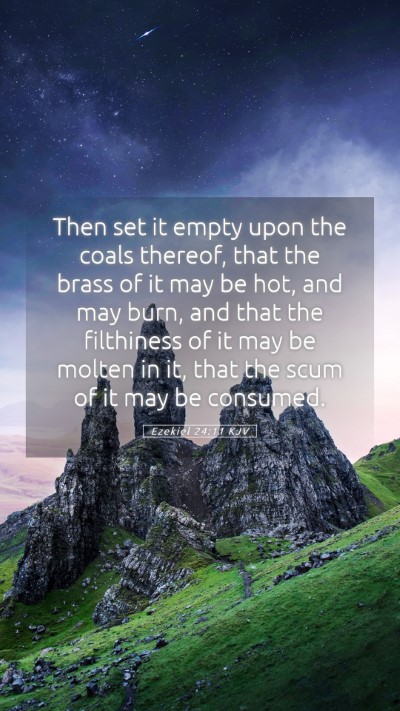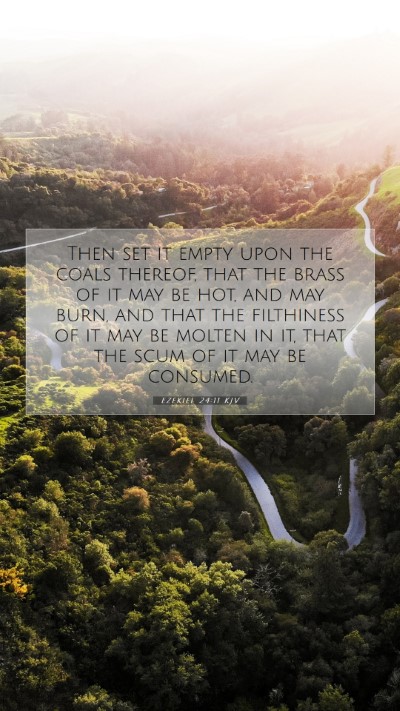Bible Verse Meaning: Ezekiel 24:11
Ezekiel 24:11: "Then set it empty upon the coals thereof, that the brass of it may be hot, and may burn, and that the filthiness of it may be molten in it, and that the scum of it may be consumed."
The verse from Ezekiel 24:11 provides profound imagery and prophetic significance. Here, God commands the prophet Ezekiel to utilize a pot to demonstrate the impending judgment upon Jerusalem. The action conveyed encompasses various themes central to the prophetic message.
Understanding the Context
This passage arises within a context of impending destruction as a consequence of the people's sin. Ezekiel utilized objects and actions to symbolize the truth of God's message. In this instance, the ‘pot’ symbolizes Jerusalem itself, which is depicted as something unclean and needing purification.
Insights from Public Domain Commentaries
Matthew Henry's Commentary
Matthew Henry emphasizes that the pot represents the city of Jerusalem filled with the iniquities of its people. The Lord's command to heat the pot until it scorches symbolizes the refining process that God would impose on the people. Henry explains that the filthiness melting away indicates God’s desire to purge sin and ultimately restore His people.
Albert Barnes' Notes on the Bible
Barnes further interprets this passage in the context of God's judgment, underscoring that the expected fire represents suffering and trials faced by the people. He notes that the malignant elements (or scum) must be eliminated for a true restoration to take place, reinforcing the themes of purification and divine justice. Moreover, he connects the burning of the filthiness to God's intent to cleanse the people so they may ultimately return to Him, portraying a dual narrative of judgment and mercy.
Adam Clarke's Commentary
Clarke elaborates that heating the pot serves as a metaphor for the fiery trials that the inhabitants of Jerusalem would undergo. He highlights that this action is a necessary precursor to transformation. Clarke explains that just as impurities are removed from the brass pot, God desires to cleanse His people, making them vessels fit for His purpose. He draws attention to the divine craftsmanship at work through pain and suffering.
Theological Themes
- Judgment and Justice: This passage vividly illustrates God’s justice—removing wickedness from His people.
- Purification: The imagery of burning and melting underscores the necessity of purification in the path to redemption.
- Restoration: There is an underlying hope that after judgment, God will restore His people.
Application to Daily Life
For modern readers, Ezekiel 24:11 serves as a reminder that through trials and tribulations, there can be purification and growth. Believers are called to reflect upon their lives, allowing God’s refining fire to cleanse their hearts of impurities. This purification ultimately leads to a more profound fellowship with God and readiness for His purposes.
Cross References
- Jeremiah 9:7: Discusses the refining process of God’s judgment.
- Ezekiel 22:18-19: Details the metaphor of God refining His people as silver and bronze.
- Malachi 3:2-3: Illustrates God as a refiner who purifies His people.
Conclusion
In Ezekiel 24:11, we find rich layers of meaning that delve into the themes of biblical exegesis, the significance of prophetic actions, and the call for spiritual introspection. As we ponder the scripture and engage in Bible study insights, we can grasp the profound message contained within and its applicability in today's lives.
Further Study and Resources
For those interested in expanding their understanding and further exploring biblical concepts, consider engaging with the following:
- Bible study groups for community insights.
- Online Bible study platforms for interactive learning.
- Bible study tools such as concordances and theological dictionaries.
- Creating Bible study plans focused on Old Testament prophetic writings.


